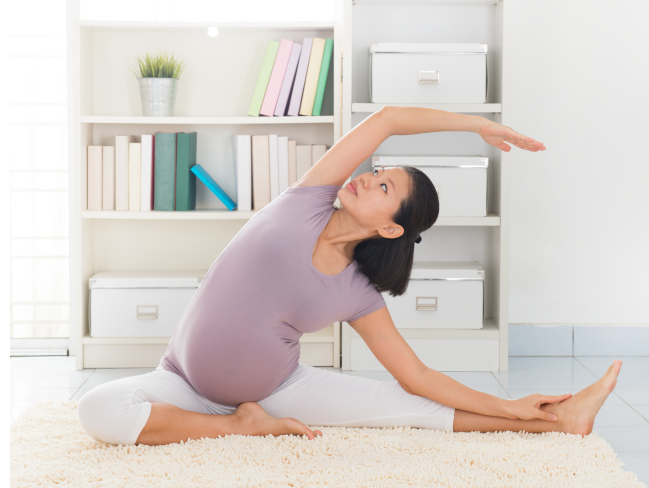
Exercise during pregnancy and after childbirth
Recreational and competitive athletes with uncomplicated pregnancies can remain active during pregnancy and should modify their usual exercise routines as medically indicated.
Previously inactive women and those with medical and obstetric complications should be evaluated before recommending physical activities during pregnancy. Exercise during pregnancy may provide additional health benefits to women with gestational diabetes.
A physically active woman with a history of risk for preterm labour or foetal growth restriction should be advised to reduce engaging in physical activities in the second and third trimesters.
Many of the physiologic and morphologic changes of pregnancy persist 4-6 weeks postpartum. Thus, pre-pregnancy exercise routines may be resumed gradually as soon as it is physically and medically safe. This will vary from one individual to another, with some women being able to resume an exercise routine within days of delivery. There are no published studies to indicate that in the absence of medical complications rapid resumption of activities will result in adverse effects.
Having undergone detraining resumption if activities should be gradual, no known maternal complications are associated with resumption of training. Moderate weight reduction whilst a pregnant woman is nursing is safe and does not compromise neonate weight gain. Finally, a return to physical activity after pregnancy has been associated with decreased incidence of postpartum depression, but only if the exercises are stress relieving and not stress provoking.
Absolute contradictions to aerobic exercise during pregnancy
- Hemodynamically significant heart disease
- Restrictive lung disease
- Incompetent cervix/cerclage
- Multiple gestation at risk of premature labour
- Persistent second or third trimester bleeding
- Placenta previa after 26 weeks of gestation
- premature labour during the current pregnancy
- Ruptured membranes
- Preeclampsia/pregnancy-induced hypertension
Relative contraindications to aerobic exercise during pregnancy
- Severe anaemia
- Unevaluated maternal cardiac arrhythmia
- Chronic bronchitis
- Poorly controlled Type I diabetes
- Morbid obesity
- Extreme underweight (BMI<12)
- History of extremely sedentary lifestyle
- Intrauterine growth restriction in current pregnancy
- Poorly controlled hypertension
- Orthopaedic limitations
- Poorly controlled seizure disorder
- Poorly controlled hyperthyroidism
- Heavy smoker
Warning signs to terminate exercise whilst pregnant:
- Vaginal bleeding
- Dyspnoea prior to exertion
- Dizziness
- Headache
- Chest pain
- Muscle weakness
- Calf pain and swelling (need to rule out thrombus phlebitis)
- Preterm labour
- Decreased foetal movement
- Amniotic fluid leakage
Generally, participation in a wide range of recreational activities appears to be safe during pregnancy. However, each sport should be reviewed individually for any potential risks. Activities with high risk of falling or abdominal trauma should be avoided during pregnancy.
In the absence of either medical or obstetric complications, 30 minutes or more of moderate exercise a day on most, if not all, days of the week is recommended for pregnant women. Exercise may be beneficial in the primary prevention of gestational diabetes, particularly in morbidly obese women (BMI>33). The American Diabetes Association has endorsed exercise as “a helpful adjunctive therapy” for gestational diabetes mellitus when euglycemia is not achieved by diet alone.
The cardiovascular changes associated with pregnancy are an important consideration for pregnant women both at rest and during exercise. After the first trimester, the supine position results in relative obstruction of venous return and, therefore, decreased cardiac output and orthostatic hypotension. For this reason, pregnant women should avoid supine positions during exercise as much as possible. Motionless standing also is associated with a significant decrease in cardiac output, so this position should also be avoided as much as possible.
In general, participation in a wide range of recreational activities appears to be safe.
The safety of each sport is determined largely by the specific movements required by that sport. Participation in recreational sports with high potential for contact, such as ice hockey, soccer and basketball could result in trauma to both the mother and foetus. Similarly, recreational activities with increased risk of falling, such as gymnastics, horseback riding, down-hill skiing and vigorous racquet sports have inherently high risk for trauma in pregnant and non-pregnant women. Those activities with high risk of falling or abdominal trauma should be avoided during pregnancy. Exertion at altitudes of up to 6,000 feet appears to be safe, in order to avoid altitude sickness. Scuba diving also should be avoided throughout the pregnancy, because the foetus will undergo an increased risk of decompression sickness.
Copyright United Family Healthcare 2018 All right reserved ICP 京ICP备13017554号-4



